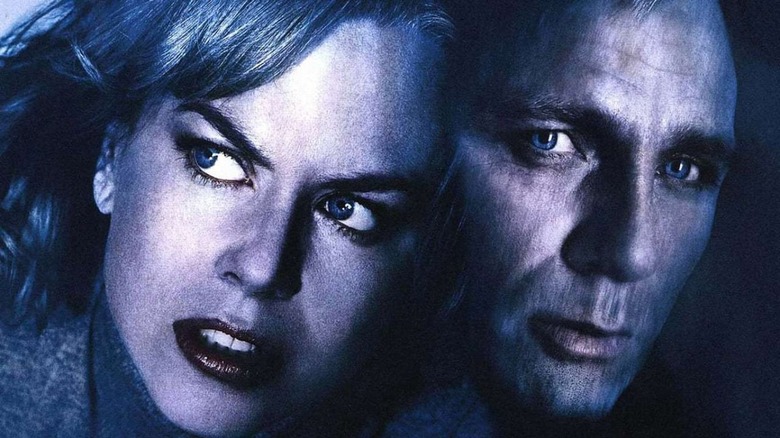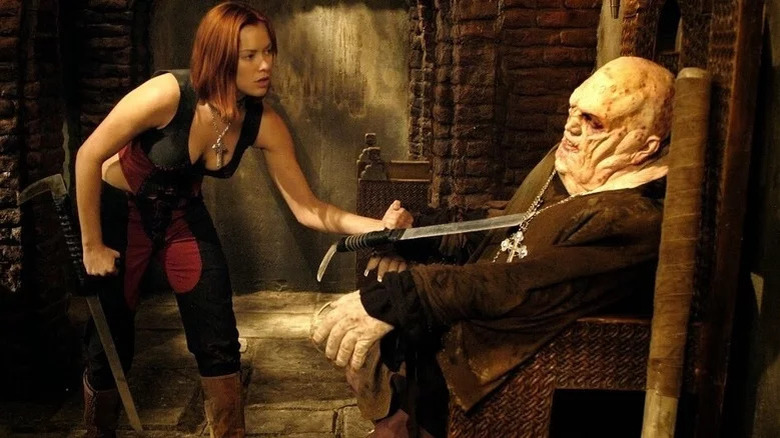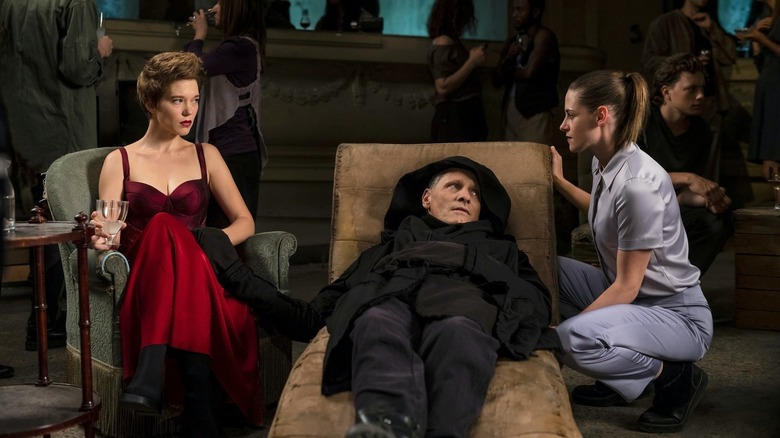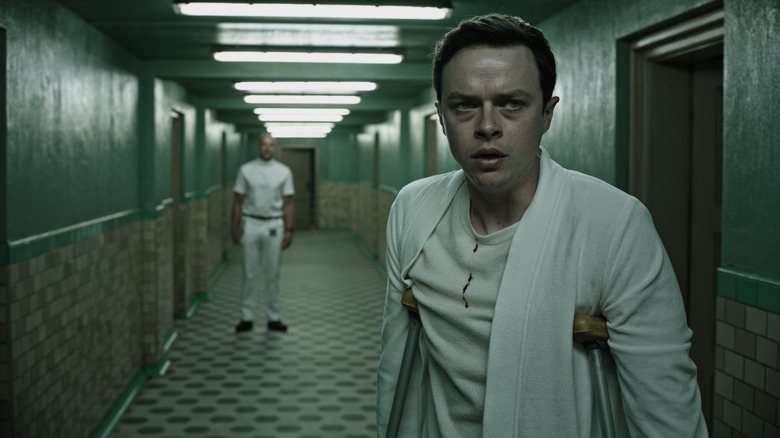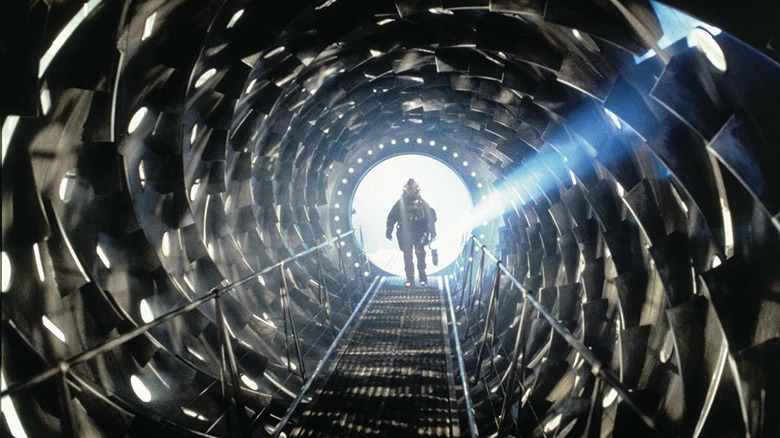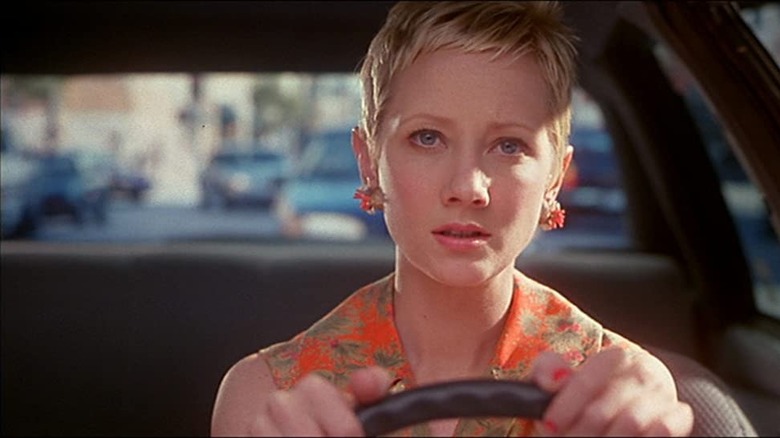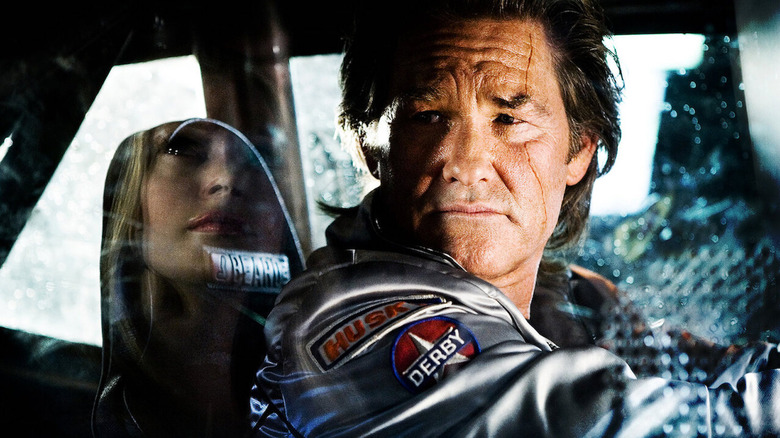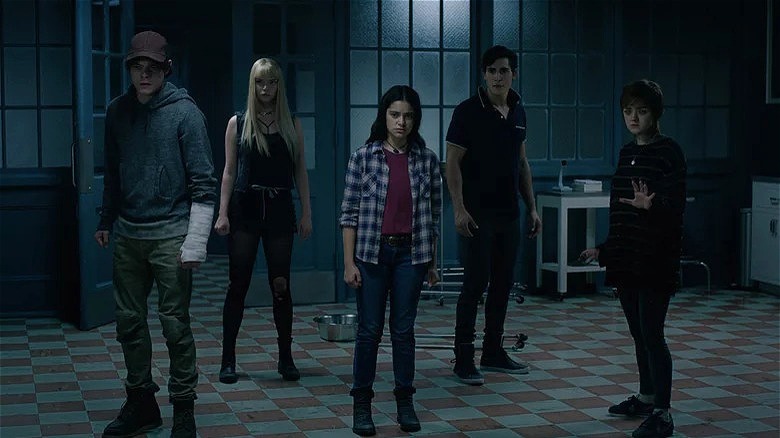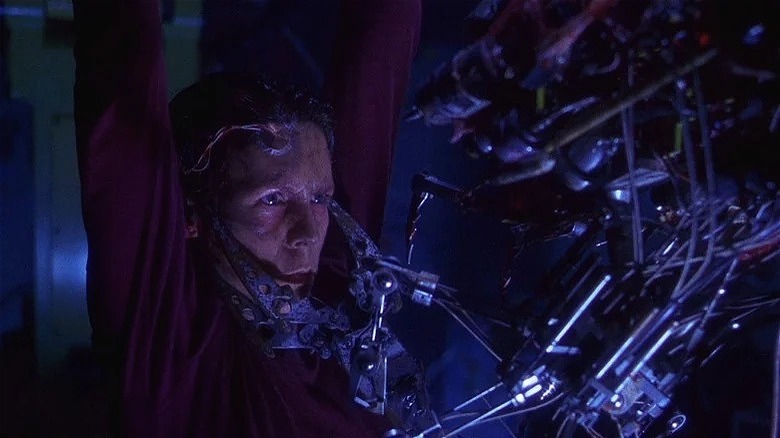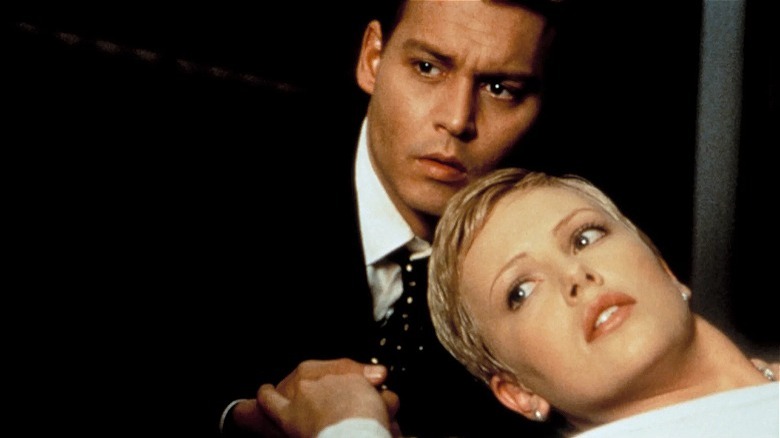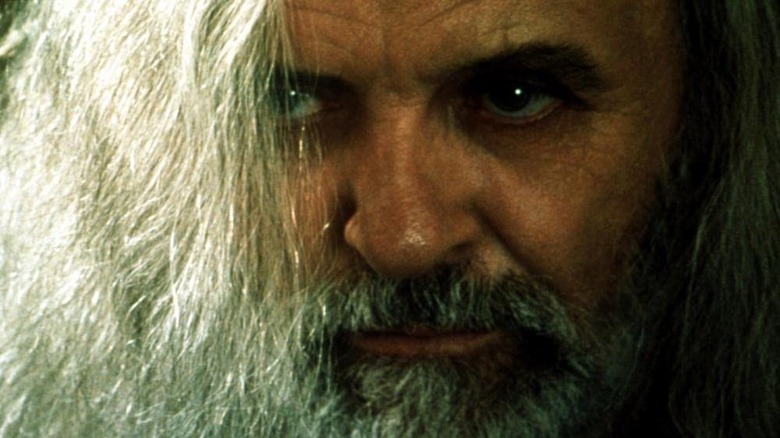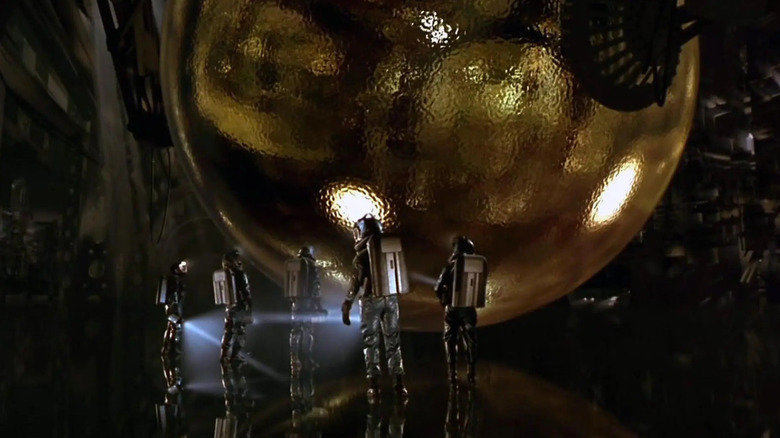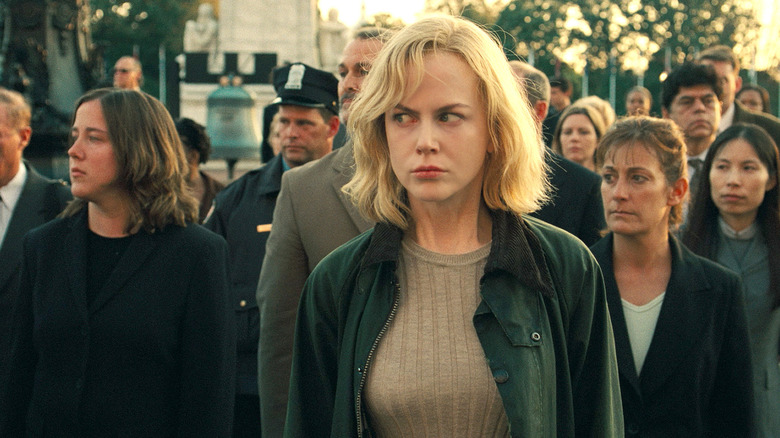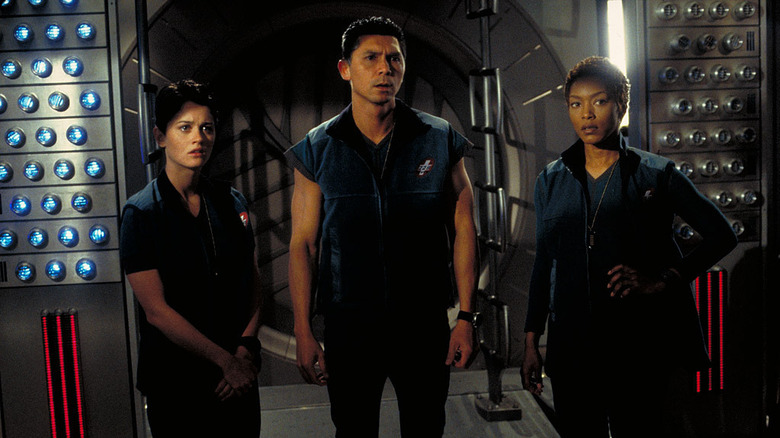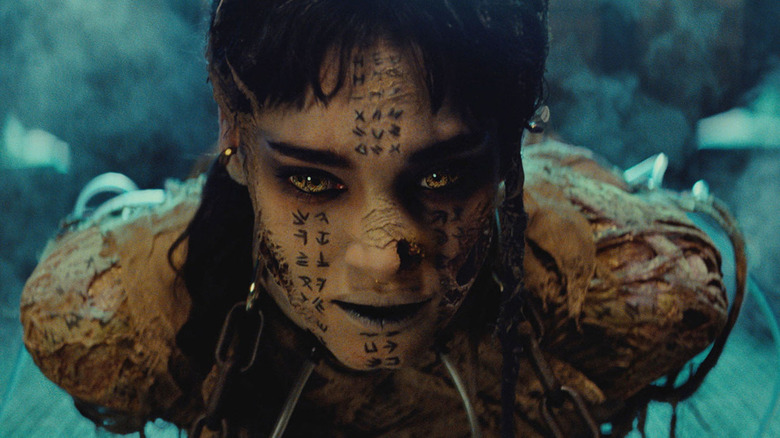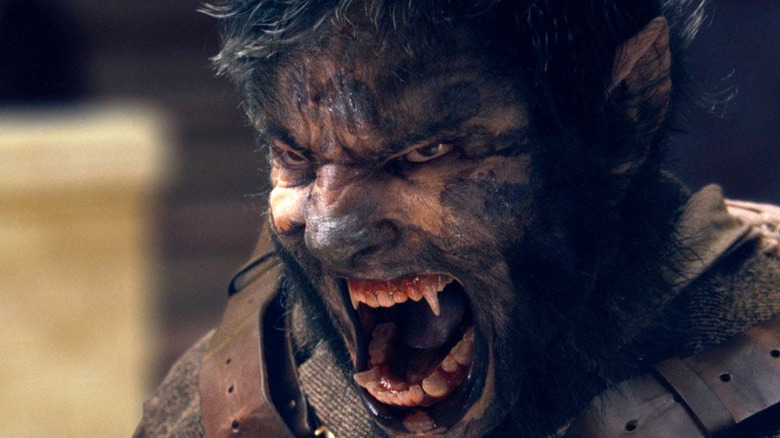The Most Expensive Flops In Horror Movie History
Historically, horror movies have tended to have lower budgets than films in other genres. A large part of this is probably due to the origins of the genre. Slasher films became something of a cultural phenomenon in the 1970s, when movies like "The Texas Chain Saw Massacre" and "Halloween" in many ways revolutionized the film industry. Such films were usually made on the cheap and relied on clever practical effects and location shooting to deliver the onscreen goods. But what really made these films so influential is that from these modest origins, they killed at the box office, revolutionizing the genre as we know it today.
Since the 1970s, movies of all genres have gotten more expensive to make, and not all of these films can earn back their production costs. While horror has remained an extremely popular genre both in the States and worldwide, scary movies are just as likely to flop as films of any other genre. And while studios seem to think audiences want their films to be bigger, badder, and pricier, this assumption doesn't always pay off. It's pretty astounding to think about how much money studios rake in -– and lose -– on a given project, and if the business end of the horror equation is a topic that's of interest to you, you're in the right place. Here's an exhaustive list of the most expensive horror movie flops of all time.
BloodRayne
Out of all the filmmakers working today, Uwe Boll might be the director most known for making flops. The German filmmaker rose to infamy crafting video game adaptations like "House of the Dead" and "Far Cry." Almost all of his films have been box-office failures and have received overwhelmingly negative responses from critics. His biggest flop thus far is the 2005 film "BloodRayne," which grossed an abysmal $3.6 million globally against a $25 million budget. Based on the video game of the same name, the film follows Rayne (Kristanna Loken), a human/vampire hybrid who intends to kill her vampire father.
The film's financial failure is in part due to a botched release strategy. After going into business with Billy Zane, who also stars in the film and had just started a distribution company, Zane promised Boll the film would screen in 2,000 theaters. However, it was reported that "BloodRayne" was only sent to 985 screens, some of which never even screened the film. But even if the release hadn't been fumbled, it's unlikely the film would have been a rousing success. Screenwriter Guinevere Turner has said that Boll is a nightmare to work with and he scrapped 80 percent of her script, resulting in "the worst movie ever made."
The failure of "BloodRayne" is far from an anomaly for Boll. His other 2005 film, "Alone in the Dark," grossed $12.6 million globally on a $20 million budget, and is also often considered one of the worst movies ever made. How's that for flop central?
Crimes of the Future
David Cronenberg films aren't for everyone, so it's not surprising that he's not exactly the king of the box office smash. "The Fly" remains one of his most profitable films, but many of his other projects have not fared as well. Case in point: Cronenberg's 2022 film "Crimes of the Future," which took in a mere $4.5 million globally on what was reportedly a $27 million budget.
A pretty typical Cronenberg film in terms of the themes it explores -– body modification, and the horrors of technological innovation -– the movie was generally well-received by critics. Veteran Cronenberg collaborator Viggo Mortensen plays Saul, a man who frequently grows totally new organs as a result of environmental factors. Saul and his partner, Caprice (Léa Seydoux), take advantage of his condition and work as performance artists. Caprice surgically removes Saul's new organs in front of a live audience, an act that makes them very famous.
It's certainly not the most grotesque of Cronenberg's films, but it clearly wasn't able to hit a nerve –- no pun intended –- with audiences. "Crimes of the Future's" low box office performance isn't unique in Cronenberg's filmography, but considering it's one of his highest-budget films, and was his first film in many years, it flopped pretty hard.
A Cure for Wellness
2016's "A Cure for Wellness" is a moderately pricey horror film that swung for the fences and missed, at least in terms of its finances. Directed by Gore Verbinski, the film follows a young stockbroker (Dane DeHaan) who is sent to fetch his boss (Harry Groener) from a wellness center in the Alps. The spooky old building is not what it seems, of course, and he soon finds it nearly impossible to leave. The film also features Mia Goth, now a bonafide scream queen, as one of the center's patients.
Despite its intriguing premise, "A Cure for Wellness" wasn't able to make a profit, grossing only $26 million globally on a $40 million budget. Though $40 million might not seem like a huge number when you consider the price tag on blockbuster films these days, it is a pretty heft budget when it comes to horror, a genre that has historically produced content inexpensively. Apparently, this wasn't the time for theatrical gothic horror, as 2015's "Crimson Peak" also disappointed at the box office. It also probably didn't help that "Get Out," one of the most successful horror films of the last decade, opened just a week after "A Cure for Wellness." It would seem the world wasn't ready for a film that features Goth laying in a bathtub filled with eels.
Event Horizon
"Event Horizon" might have retroactively become something of a cult classic, but audiences at the time certainly weren't ready to throw their money at it. Directed by Paul W. S. Anderson, a filmmaker known best for his work on the "Resident Evil" franchise as well as "Alien vs. Predator," "Event Horizon" is a sci-fi horror film that is equal parts weird and disturbing. Sam Neill plays William Weir, the creator of a spaceship called the Event Horizon that has mysteriously disappeared. Weir and a crew led by Captain Miller (Laurence Fishburne) are sent to investigate, not aware of the horrors that await them.
Sci-fi horror is not always the goriest of genres, but "Event Horizon" turns this assumption on its head. The scariest scene in the film involves the team recovering footage that depicts what happened to the previous Event Horizon crew, and it is not pretty. As the legend goes, the scene was originally even more brutal but had to be cut for the theatrical release.
The film cost $60 million to make but only grossed $26 million at the domestic box office, and wasn't able to recoup the rest of the budget internationally, either.
Psycho
Horror movie remakes are a contentious topic among cinephiles and, more often than not, they're not received especially well. While there are some instances where the remakes are actually better than the original, that isn't always the case. Take Gus Van Sant's 1998 remake of "Psycho," an infamous horror dud. It's a pretty ballsy movie to remake what is often regarded as the most influential horror film of all time, but not everyone was convinced. Critics mostly dismissed it, but there are those who consider it fascinating and bold.
The biggest criticism of "Psycho" centers on the fact that is basically a shot-for-shot remake of the original, which is true. Much has also been said about the casting, as, rather unexpectedly, Vince Vaughn played Norman Bates. The rest of the cast is equally eclectic, with Anne Heche portraying Marion alongside the likes of Julianne Moore, Viggo Mortensen, Willam H. Macy, Rita Wilson, and Flea from the Red Hot Chili Peppers. Audiences at the time weren't sold on Van Sant's experimental facsimile, as it grossed $37 million globally on a $60 million budget. If only Hitchcock were alive to see it.
Grindhouse
Quentin Tarantino fans consider "Grindhouse" to be one of the director's underrated classics, but audiences didn't greet the film warmly upon release. For starters, "Grindhouse" is actually two films put together: Robert Rodriguez's "Planet Terror," a zombie movie starring Rose McGowan, Freddy Rodriguez, Michael Biehn, Jeff Fahey, Josh Brolin, and Marley Shelton, and Tarantino's "Death Proof," which follows Stuntman Mike (Kurt Russell), who spends his free time killing women with his souped-up car. Mike finally meets his match when he goes after a group of friends played by Rosario Dawson, Mary Elizabeth Winstead, Tracie Thoms, and real-life stuntwoman Zoe Bell (as herself).
A tribute to exploitation movies, the two films are each preceded by fictitious trailers directed by Edgar Wright, Eli Roth, and Rob Zombie. While critics liked "Grindhouse," audiences were not on board. To be fair, a three-hour double feature is a pretty hard sell, and not everyone is a fan of the blood and guts that Rodriguez and Tarantino giddily showcased. Moreover, while the film's title refers to the gritty Manhattan theaters that exploitation films once played in, the industry had become much more mainstream by 2007.
"Grindhouse" cost $67 million, much more than a classic exploitation film, but only managed to make $25 million at the domestic box office. Now-disgraced producer Harvey Weinstein was so upset about the film's financial failure in the States that he split the films up for international release. "Death Proof" came out on top, earning $30 million on the global stage, while "Planet Terror" earned $11 million.
The New Mutants
Before the MCU became what it is today, The X-Men was one of the most popular Marvel film properties. That is no longer the case, as recent forays into the X-Men extended universe have been less than successful. "The New Mutants" took a very long road to theaters, and the behind-the-scenes drama is likely at least in part to blame for the film's financial failure. The film was delayed a whopping four times, which resulted in it being released more than two years after its original release date.
"The New Mutants" follows a group of teenage mutants -– played by Anya Taylor-Joy, Maisie Williams, Blu Hunt, Henry Zaga, and Charlie Heaton –- held at a facility where they are supposedly being helped to curb their powers. They soon begin to question their incarceration and fight to escape.
The film was initially described as a "hybrid-horror 'Breakfast Club' movie," but director Josh Boone constantly butted heads with Fox executives and rejected most of their proposed script changes. Following the popularity of the trailer for "It," executives felt it wise to lean even further into the film's horror elements and move away from its YA direction. Things became even more complicated due to Fox's merger with Disney, which delayed reshoots. The final product only made $44.6 million at the worldwide box office against a $67 million budget, a logical result considering it was released in August of 2020, during the pandemic.
Virus
Jamie Lee Curtis may be an iconic final girl, but that doesn't mean any horror film she stars in will be a guaranteed success. One of the biggest flops of Curtis' career is 1999's "Virus," which, for the most part, has been completely forgotten. With a $75 million budget, "Virus" only scared up $30 million at the box office. Robert Everton (Donald Sutherland) is a tugboat commander who comes across an abandoned vessel that could be salvaged for a hefty profit. Although they are caught in a typhoon, Everton and his crew, (which includes Curtis and William Baldwin), decide to board the vessel and investigate. What they find aboard are ... wait for it ... aliens! Derivative and absurd horrors ensue.
It's not too hard to guess why "Virus" performed so poorly at the box office. It's a truly terrible movie. Roger Ebert hated it more than almost any other movie he ever reviewed, and Jamie Lee Curtis has nothing good to say about it. "'Virus' is so bad that it's shocking ... That would be the all-time piece of s*** ... It's just dreadful ... " she told IGN in 2003.
Salvagers boarding spooky abandoned ships was a strangely popular story during this period, as "Deep Rising," which follows a very similar plot, was released in 1998, and 2002 saw the release of the Julianna Margulies thriller "Ghost Ship." But while the extremely goofy "Ghost Ship" has maybe one or two redeeming qualities (and did moderately well at the box office), there's no saving "Virus."
The Astronaut's Wife
"The Astronaut's Wife" is a major horror flop that has largely been lost to the annals of history, but we're going to revive it for a moment. Johnny Depp plays Spencer, an astronaut who works for NASA. Spencer and his partner are sent on a spacewalk, and when they return, something is not right. Johnny's wife, Jillian (Charlize Theron), notices that Spencer's personality has begun to change, but tries to ignore her worries when she learns she's pregnant with twins.
The film was released in August of 1999 and was a box office failure, grossing only $19 million globally on a budget of $75 million. Unlike other horror misfires that have gone on to achieve cult-classic status, "The Astronaut's Wife" has received no such critical reappraisal. The plot is incredibly derivative -– have you ever wondered what would happen if "Rosemary's Baby" was sent to space? –- and oddly slow-moving for a movie marketed as a sci-fi thriller. You can probably guess where the plot of the film goes just from this brief description, and there is nothing shocking enough to justify all the brooding suspense.
Instinct
Anthony Hopkins may be most famous for his incredible turn as serial killer Hannibal Lecter in "The Silence of the Lambs," but that isn't the actor's only foray into psychologically deranged territory. Unfortunately, Hopkins' next thriller wasn't nearly as successful. In the 1999 film "Instinct," Hopkins plays anthropologist Ethan Powell, a man who disappeared in the African jungle, where he was studying gorillas. Powell only reemerges when it's revealed that he killed two poachers who were getting in the way of his work. Powell seems to be completely out of his mind after cohabitating exclusively with gorillas for years, so psychiatrist Theo Caulder (Cuba Gooding Jr.) is brought in to get inside his head.
The film proved unpopular with audiences and critics alike and grossed only $34 million globally against an $80 million budget. The movie portends to delve into important topics like animal rights and prison reform, but none of the issues is illuminated in any novel way. As Roger Ebert wrote in his review, "The movie's just so darned uplifting and clunky, as it shifts from one of its big themes to another while groaning under the weight of heartfelt speeches." If you're looking for a movie about fighting for gorillas or resisting psychiatric institutions, you'd probably have a better time watching "Gorillas in The Mist" or "One Flew Over the Cuckoo's Nest" instead.
Sphere
1998's "Sphere" is a sci-fi thriller that doesn't offer anything new to the genre. Dustin Hoffman stars as Norman Goodman, a psychologist who authored a government report detailing how to deal with the arrival of aliens. When a spaceship is discovered under the ocean, Goodman's plan is put into action and he and his team –- which includes marine biologist Dr. Beth Halperin (Sharon Stone), mathematician Dr. Harry Adams (Samuel L. Jackson), and astrophysicist Dr. Ted Fielding (Liev Schreiber) –- are sent to investigate. Underwater science ensues, and what the team discovers stretches their understanding of time and space.
Many critics at the time noted that themes explored in the film have been better executed by other sci-projects, and the script isn't especially coherent. It's a shame, really, because with a stellar cast and intriguing concept -– a spaceship underwater –- a better script might have resulted in something truly worth celebrating. Audiences were as underwhelmed with the film as critics were, and the movie topped out at $50 million at the international box office on a budget of $73 million. Big swings in sci-fi tend to fall the hardest –- especially when expensive special effects are involved -– and "Sphere" just couldn't hack it in the majors.
The Invasion
2007's "The Invasion" is one of the most ill-fated remakes of the 21st century, grossing only $40 million at the global box office on a whopping budget of $80 million. The fourth adaption of the 1954 book "The Body Snatchers," "The Invasion" intends to stylishly illustrate the particular problems of the 2000s, with little success. The film stars Nicole Kidman as Carol Bennell, a psychiatrist living in Washington D.C. After a space shuttle crashes into the Earth, Carol notices that everyone around her seems to have turned into emotionless drones. She teams up with her doctor friend Ben Driscoll (Daniel Craig), who may be the only other person on the planet aware of what's happening.
Though the film was originally pitched as a straight remake, David Kajganich wrote a script that was meant to take the story in a new direction, hence the shortened title. The studio was unhappy with the first cut of the film and hired the Wachowskis to rewrite the script. "V For Vendetta" filmmaker James McTeigue was later brought in to direct reshoots.
The resulting film doesn't add anything fresh to this well-worn story, despite everyone's best efforts. The constant references to the Iraq War are both repetitive and uninspired, and poor Kidman and Craig do their best with a script that tends to lack any emotional logic. Kidman's earlier foray into the thriller genre, "The Others," is a much more satisfying -– and financially successful –- spookfest.
Supernova
The 2000 film "Supernova" had a long road to the big screen, a process that may be to blame for the movie's financial failure. The film follows the crew of a medical ship in the 22nd century who answer a distress call from a distant galaxy. James Spader, Angela Bassett, Robert Forster, Lou Diamond Phillips, Robin Tunney, and Wilson Cruz play the crew. Their rescue mission turns dangerous when they encounter alien technology, the mysterious intentions of the man they rescued, and a giant star about to explode.
Walter Hill, credited under the pseudonym of "Thomas Lee," directed the first cut. He eventually disowned the film. The budget was slashed and Hill quit, so MGM tapped Jack Sholder, who'd previously been in contention to direct, to oversee reshoots and edits. MGM executives, also displeased with Sholder's cut, asked Hill to return, but when they refused Hill's proposal for reshoots, Hill quit a second time.
Finally, Francis Ford Coppola was hired to re-edit the film, resulting in the final cut we see today. One of the most bizarre choices Coppola made was to turn an intimate scene between Tunney and Peter Facinelli's characters into a scene between Spader and Bassett. What Coppola did was essentially digitally replace Tunney and Facinelli's heads with Spader and Bassett's, as well as alter Tunney's skin tone. Coppola's strange editing choices did not help things much, as the film grossed only $14 million at the domestic box office against a staggering $90 million budget.
The Mummy
Tom Cruise is one of the most reliable box-office draws working today, but it turns out his formidable star power isn't always enough to turn a profit. In 2017, Cruise starred in a reboot of Universal's iconic "Mummy" franchise. It seemed like a smart bet. Cruise plays Nick Morton, an Army sergeant who plunders ancient treasures and sells them for loads of money. During their travels, Nick and his partner (Jake Johnson) accidentally awaken an ancient Egyptian princess (Sofia Boutella), who possesses terrifying powers.
Looking at the box office numbers for the film, it might seem like "The Mummy" made a good deal of money, earning $400-plus million at the international box office on a budget of $125 million. But those numbers don't tell the full story. According to Deadline, the movie may have lost Universal $95 million. On the surface, this is somewhat perplexing, as "The Mummy" actually marked Tom Cruise's biggest global opening up to that point. But while the film's budget was $125 million –- no small change –- the total production investment was around $345 million, covering production, prints, and marketing, etc.
The Wolfman
You'd be forgiven for never having heard of "The Wolfman," because it seems to have left little impact on the culture at large (apart from being a cautionary tale). The film is a remake of the 1941 picture "The Wolf Man," and it stars Benicio del Toro, Anthony Hopkins, Emily Blunt, and Hugo Weaving. Del Toro plays Lawrence Talbot, an aristocrat who returns to his ancestral home after hearing word that his brother has gone missing. While home, Lawrence reunites with his father, Sir John (Hopkins), who may hold the key to deadly family secrets.
With an enormous budget of $150 million, the film wasn't able to recoup that money at the box office, earning only $139 million worldwide. Like many movie flops, the film experienced numerous production troubles. Mark Romanek was originally hired to direct but left due to creative differences. Joe Johnston arrived as his replacement. Though initially budgeted at $85 million, it blossomed to nearly twice that cost by the time production finished. The film was then cut down by 30 minutes, which meant Danny Elfman's score had to be totally reworked. The result of all this drama? Former Universal Pictures head Ron Meyer called it "one of the worst movies we ever made," and it lost a lot of money for the studio.
